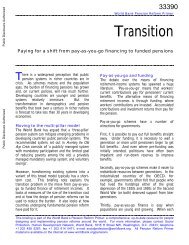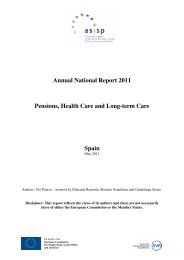Financial Sector Development in Africa: Opportunities ... - World Bank
Financial Sector Development in Africa: Opportunities ... - World Bank
Financial Sector Development in Africa: Opportunities ... - World Bank
You also want an ePaper? Increase the reach of your titles
YUMPU automatically turns print PDFs into web optimized ePapers that Google loves.
The Potential of Pro-Market Activism for F<strong>in</strong>ance <strong>in</strong> <strong>Africa</strong>: A Political Economy Perspective 189<br />
A major focus of public action has been on develop<strong>in</strong>g contractual and<br />
<strong>in</strong>formational <strong>in</strong>stitutions. At the top of the agenda are collateral and<br />
bankruptcy law reforms that aim to protect the rights of both borrowers<br />
and lenders <strong>in</strong> order to facilitate lend<strong>in</strong>g. Other major reforms aim at<br />
improv<strong>in</strong>g the court system or build<strong>in</strong>g alternative dispute resolution<br />
mechanisms and establish<strong>in</strong>g asset and collateral registries. Public action<br />
also focuses on strengthen<strong>in</strong>g <strong>in</strong>dependent bank regulation and supervision,<br />
<strong>in</strong>clud<strong>in</strong>g the formulation and implementation of account<strong>in</strong>g and<br />
disclosure standards. Such measures <strong>in</strong>tend to <strong>in</strong>crease not only the stability<br />
of the f<strong>in</strong>ancial system but also its capacity for competition and <strong>in</strong>novation,<br />
two key determ<strong>in</strong>ants of outreach.<br />
It has become part of ma<strong>in</strong>stream economic th<strong>in</strong>k<strong>in</strong>g that there is<br />
room for pro-market activism <strong>in</strong> the form of carefully designed, marketfriendly<br />
government <strong>in</strong>terventions <strong>in</strong> the f<strong>in</strong>ancial sector to address<br />
specific market failures “while the fruits of ongo<strong>in</strong>g <strong>in</strong>stitutional reform<br />
are still unripe” (De la Torre, Gozzi, and Schmukler 2007). In contrast to<br />
the earlier market-replac<strong>in</strong>g approach, pro-market activism is based<br />
on the assumption that markets can broaden access to f<strong>in</strong>ance, and therefore<br />
the goal of government <strong>in</strong>terventions is to develop or enable markets,<br />
not to replace them (Beck, Fuchs, and Uy 2009; De la Torre, Gozzi, and<br />
Schmukler 2007). To improve the <strong>in</strong>termediation of f<strong>in</strong>ancial resources<br />
<strong>in</strong>to higher levels of <strong>in</strong>vestment, proponents of pro-market activism recommend<br />
that governments use a comb<strong>in</strong>ation of sticks (dis<strong>in</strong>centives),<br />
such as moral suasion, and carrots (rewards), such as tax <strong>in</strong>centives.<br />
Considerations of f<strong>in</strong>ancial susta<strong>in</strong>ability have become central to the<br />
design of pro-market <strong>in</strong>terventions (De la Torre, Gozzi, and Schmukler<br />
2007). Although government <strong>in</strong>terventions are acknowledged to possibly<br />
create <strong>in</strong>efficiencies <strong>in</strong> the short-term allocation of resources, the key<br />
underly<strong>in</strong>g assumption is that time-bound pro-market activist policies<br />
may <strong>in</strong>crease long-term productivity.<br />
Pro-market activism can take the form of affirmative regulatory policy.<br />
One of the most prom<strong>in</strong>ent examples of such policy is the establishment<br />
of credit registries. Credit registries give access to clients’ credit history<br />
and <strong>in</strong>crease the transparency of borrower quality, which makes it safer<br />
for f<strong>in</strong>ancial <strong>in</strong>stitutions to lend to new customers. Credit registries also<br />
allow borrowers to build reputational collateral that <strong>in</strong>creases their barga<strong>in</strong><strong>in</strong>g<br />
power for the terms of credit. <strong>Bank</strong>s are not always supportive of<br />
build<strong>in</strong>g credit registries, if do<strong>in</strong>g so will entail the compulsory shar<strong>in</strong>g of<br />
their <strong>in</strong>formation with other lenders, thereby <strong>in</strong>creas<strong>in</strong>g competition.<br />
In some countries the authorities have therefore started to push beyond







